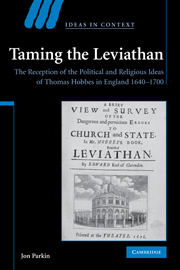 Taming the Leviathan
Taming the Leviathan Book contents
- Frontmatter
- Contents
- Acknowledgements
- Introduction
- 1 Reading Hobbes before Leviathan (1640–1651)
- 2 Leviathan (1651–1654)
- 3 The storm (1654–1658)
- 4 Restoration (1658–1666)
- 5 Hobbes and Hobbism (1666–1675)
- 6 Hobbes and the Restoration crisis (1675–1685)
- 7 Hobbism in the Glorious Revolution (1685–1700)
- Conclusion
- Bibliography
- Index
- Ideas in Context
7 - Hobbism in the Glorious Revolution (1685–1700)
Published online by Cambridge University Press: 05 May 2010
- Frontmatter
- Contents
- Acknowledgements
- Introduction
- 1 Reading Hobbes before Leviathan (1640–1651)
- 2 Leviathan (1651–1654)
- 3 The storm (1654–1658)
- 4 Restoration (1658–1666)
- 5 Hobbes and Hobbism (1666–1675)
- 6 Hobbes and the Restoration crisis (1675–1685)
- 7 Hobbism in the Glorious Revolution (1685–1700)
- Conclusion
- Bibliography
- Index
- Ideas in Context
Summary
James II undoubtedly benefited at first from both the Hobbesian anxieties and attitudes generated in the first half of the 1680s. At the level of propaganda, the Tory view of Hobbes as the patron of sedition could be wheeled out to condemn opposition. In the thanksgiving sermons for the defeat of Monmouth at Sedgemoor in July 1685, Henry Hesketh, preaching before the king, alluded to Leviathan as part and parcel of the republican consent theories that had motivated the rebels. More common were allusions to Hobbes's de factoism as a theory that had encouraged individuals to believe that they could seize the throne. John Goodricke preached to the lawyers at Lincoln's Inn that Mr Hobbes's state of nature ‘would justify all Wars, Rebellions, and unjust Invasions upon the Rights of Others’ and that his theory had been designed in the first place ‘to support an Olivarian Usurpation’. Thomas Wagstaffe similarly assaulted the thought ‘That every Man should enjoy the Benefit of Laws, and Society, and the King … should be in Hobs's State of Nature, and every Man had a Right to everything of His. And if a Man can but get together Men and Arms … he may lay Claim to the King's Crown and Dignity.’ But the condemnations again went hand in hand with the thought that the beckoning Hobbesian anarchy, however unnatural its genesis, required an authoritarian solution.
- Type
- Chapter
- Information
- Taming the LeviathanThe Reception of the Political and Religious Ideas of Thomas Hobbes in England 1640–1700, pp. 378 - 409Publisher: Cambridge University PressPrint publication year: 2007


